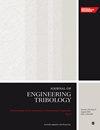纳米二氧化硅和香料型草药油对米糠油摩擦学性能及氧化稳定性的影响
IF 1.8
3区 工程技术
Q3 ENGINEERING, MECHANICAL
Proceedings of the Institution of Mechanical Engineers, Part J: Journal of Engineering Tribology
Pub Date : 2023-03-15
DOI:10.1177/13506501231162396
引用次数: 1
摘要
在全球范围内,由于矿物油的成本、可用性和与不同工程材料的兼容性,大多数行业都在使用矿物油基润滑剂。基于矿物油的产品的逐渐耗竭和对环境的负面影响促使人们寻找一些潜在的替代品。可生物降解和无毒的植物油被认为是矿物油的潜在替代品。然而,它们表现出一定的局限性,如氧化稳定性较差,云和倾点特性差。本研究将草药油作为新型抗氧化剂,并研究了纳米颗粒与草药油的协同作用。以米糠油(RBO)为基础油,添加生姜油(GO)、黑胡椒油(BP)和二氧化硅纳米颗粒等添加剂,制备改性米糠油(MRBO)。在RBO中添加0.05 wt.%的SiO2后,磨痕直径(WSD)显著降低了18.8%。草本油与SiO2的协同作用使RBO的摩擦系数(COF)显著降低了15.5%。与商用润滑油(COM)相比,开发油的氧化稳定性也优于RBO。本文章由计算机程序翻译,如有差异,请以英文原文为准。
Tribological property and oxidation stability evaluation of rice bran oil with silicon dioxide nanoparticles and spicy aroma-based herbal oils as additives
Around the globe, the majority of industries are utilizing mineral oil-based lubricants because of their cost, availability, and compatibility with different engineering materials. The progressive depletion and negative impacts of mineral oil-based products on the environment have led to the search for some potential alternatives. Biodegradable and nontoxic vegetable oils are considered a potential replacement for mineral oils. However, they exhibit certain limitations such as less oxidation stability, poor cloud, and pour point characteristics. In the present study, herbal oils are used as novel antioxidants, and also the synergetic effect of nanoparticles and herbal oils are studied. The modified rice bran oil (MRBO) was formulated using rice bran oil (RBO) as base oil with optimum concentrations of additives such as ginger oil (GO), black pepper (BP) oil, and silicon dioxide nanoparticles. The wear scar diameter (WSD) was reduced significantly by 18.8% after the addition of 0.05 wt.% of SiO2 to RBO. The synergetic effect of herbal oils and SiO2 has significantly reduced the coefficient of friction (COF) of RBO by 15.5%. The oxidation stability of developed oil was also found to be better than RBO when compared to that of commercial lubricant (COM).
求助全文
通过发布文献求助,成功后即可免费获取论文全文。
去求助
来源期刊

CiteScore
4.20
自引率
5.00%
发文量
110
审稿时长
6.1 months
期刊介绍:
The Journal of Engineering Tribology publishes high-quality, peer-reviewed papers from academia and industry worldwide on the engineering science associated with tribology and its applications.
"I am proud to say that I have been part of the tribology research community for almost 20 years. That community has always seemed to me to be highly active, progressive, and closely knit. The conferences are well attended and are characterised by a warmth and friendliness that transcends national boundaries. I see Part J as being an important part of that community, giving us an outlet to publish and promote our scholarly activities. I very much look forward to my term of office as editor of your Journal. I hope you will continue to submit papers, help out with reviewing, and most importantly to read and talk about the work you will find there." Professor Rob Dwyer-Joyce, Sheffield University, UK
This journal is a member of the Committee on Publication Ethics (COPE).
 求助内容:
求助内容: 应助结果提醒方式:
应助结果提醒方式:


